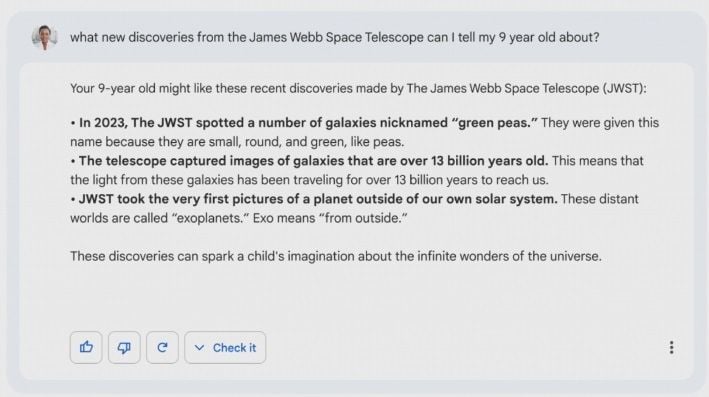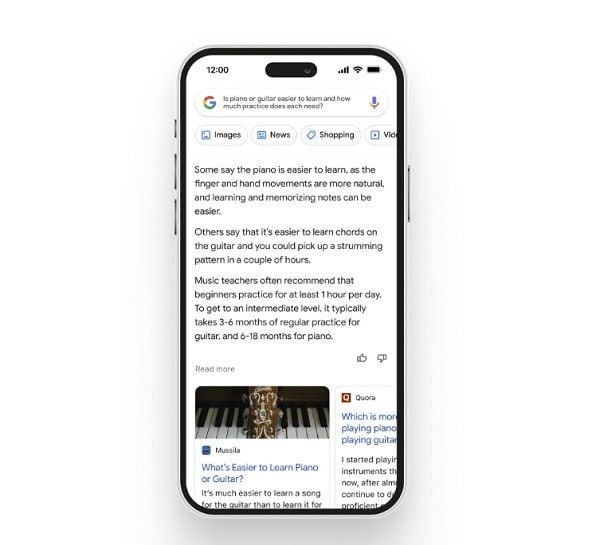With Microsoft looking to integrate ChatGPT into Bing, and many proclaiming AI responders to be the next evolution of search, it seemed inevitable that Google, too, would eventually throw its hat into the generative AI ring.
Today, Google has announced Bard, a conversational AI service which will provide ‘fresh, high-quality responses’ to questions via information sourced from across the web.

Which looks a lot like ChatGPT – though Google’s also keen to reiterate that it’s been developing its systems for years.
“AI is the most profound technology we are working on today. Whether it’s helping doctors detect diseases earlier or enabling people to access information in their own language, AI helps people, businesses and communities unlock their potential. And it opens up new opportunities that could significantly improve billions of lives. That’s why we re-oriented the company around AI six years ago – and why we see it as the most important way we can deliver on our mission: to organize the world’s information and make it universally accessible and useful.”
Six years. See, Google’s not just jumping on the AI bandwagon.
Google has been talking up its AI technology, in response to the hype around ChatGPT, while also criticizing ChatGPT’s models for their inaccuracy and potential for reputational risk.
Now, it’s putting its own tool up for comparison. And while many are already enamored with ChatGPT’s process, Google’s variation will also likely attract attention – especially if you’re looking to use AI outputs as SEO copy.
To be clear, Google says that AI-generated content is against its guidelines. But surely, if you were going to use it for such purpose anyway, surely Google’s own AI output is less likely to get pinged by Google’s crawlers than any others, right?
In fairness, I wouldn’t use any AI output straight up, at least without significant editing, as the risk of errors, plagiarism and misinformation is too great. There are also tools being developed which will detect AI outputs, and while they’re not overly great at such right now, eventually, there’s a good chance that you’ll get caught out using AI-generated content, either way.
So it’s probably not the ideal solution for SEO copy – while Bard is also more aligned with discovery, as opposed to outputting content:
“One of the most exciting opportunities is how AI can deepen our understanding of information and turn it into useful knowledge more efficiently – making it easier for people to get to the heart of what they’re looking for and get things done. When people think of Google, they often think of turning to us for quick factual answers, like ‘how many keys does a piano have?’ But increasingly, people are turning to Google for deeper insights and understanding – like, ‘is the piano or guitar easier to learn, and how much practice does each need?’ Learning about a topic like this can take a lot of effort to figure out what you really need to know, and people often want to explore a diverse range of opinions or perspectives.”

So as Google says, it’s more in line with its mission to organize information, as opposed to branching into a new, ChatGPT line.
But it is very similar. Maybe better? Hard to say as yet, because it’s also not as readily available in a straight-up consumer app.
Google says that it will soon make Bard available in Search, where it will be able to generate answers in-stream, while it’s also looking to release an isolated version of the Bard UI, along with developer releases.
“Next month, we’ll start onboarding individual developers, creators and enterprises so they can try our Generative Language API, initially powered by LaMDA with a range of models to follow. Over time, we intend to create a suite of tools and APIs that will make it easy for others to build more innovative applications with AI.”
So, another AI tool to consider, and another reminder that such apps are likely here to stay.
Oh, also, at the same time as Google announced this, Microsoft announced a press conference for tomorrow in conjunction with OpenAI.
Seems that the Search battle is back on after years of it being a one-way street.



